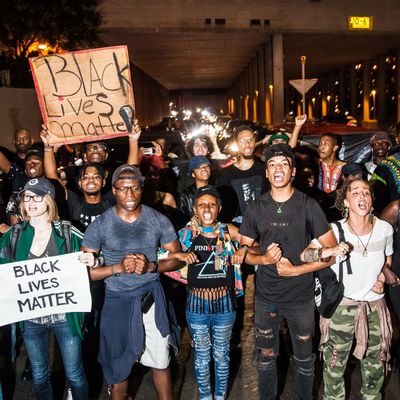
A majority of registered voters consider racism against African-Americans to be an “extremely serious” or “very serious” problem. Alas, the same poll finds that only 23 percent of Republicans feel this way. And while the horrifying police murders of Alton Sterling and Philando Castile have inspired some intellectuals on the right to acknowledge the persistence of racial disparities in law enforcement, the voice of racial backlash has predictably emerged. Conservatives like Brit Hume and Myron Magnet are lashing out at a wide array of subjects — Black Lives Matter activists, President Obama, black crime in general — in a perfectly emblematic display of the reflexive denial that remains the foundation of right-wing racial thought.
The reactionary beliefs are hard to pin down, as they are more diffuse expressions of resentment than any kind of specific analytic claim. But their few points of specific argumentation are instructive. Hume, for instance, cites Harvard economist Roland Fryer’s study of police violence. “The study found that while police were more often likely to get physical with black suspects than with white ones, when it came to police shootings, there was no racial bias,” rages Hume. “Did you hear that, Mr. President? No racial bias.”
This is a remarkable conclusion. It is true this study does find no racial bias in police shootings. It is one study; others have arrived at different conclusions, because it is common for social scientists to yield differing conclusions when measuring difficult-to-measure social phenomena. But even if we assume this one study is completely correct, Hume is bizarrely downplaying its other conclusions about the greater use of police force against African-Americans. The study found police were more likely to use their hands, handcuffs, pepper spray, batons, and so on if the suspect was black rather than white. Isn’t that in and of itself a social problem worthy of addressing?
Fryer himself explains to the New York Times the importance of police mistreatment to the African-American experience of racism:
Who the hell wants to have a police officer put their hand on them or yell and scream at them? It’s an awful experience. Every black man I know has had this experience. Every one of them. It is hard to believe that the world is your oyster if the police can rough you up without punishment. And when I talked to minority youth, almost every single one of them mentions lower-level uses of force as the reason why they believe the world is corrupt.
John McWhorter, a moderately conservative writer, draws the same conclusion as Fryer, writing, “More than anything else, the reason black Americans say racism persists is this: the cops.” If Hume requires more trustworthy sources of authentication than a moderate conservative like McWhorther or the author of the study Hume is citing as evidence for his own position, he could perhaps listen to the police officers from New Mexico and Michigan who, following Hurricane Katrina, spent time working with the Baton Rouge Police Department. Those officers found the racism and brutality among Baton Rouge cops so pervasive and disturbing — it included referring to African-Americans as “animals” who needed to be beaten down — that they registered complaints. Or perhaps Hume could simply trust his own eyes and watch officers from that same department carry out a summary execution of a prone Alton Sterling.
The reactionary’s response to this reality is to change the subject to the sources of his own grievance. Hume complains that Obama spends too much time talking about police abuses. “He’s not failed to speak out whenever a black is killed by a white police officer, but has said next to nothing about the continued slaughters of blacks by other blacks in the streets of Chicago, Baltimore, and other cities.” Really? Obama has “not failed to speak out whenever a black is killed by a white police officer”? Since the beginning of 2015 alone, police have shot and killed 381 African-Americans. Hume believes Obama has spoken out about every single one of these episodes? Plus every other police killing of a black person during his two terms in office? Magnet likewise asserts, bizarrely, “Anytime a non-black man killed an African-American, Obama cried racism and said it could have been him or his son, if he’d had one.” By “anytime” he means literally one time.
What could possibly be driving these conservatives to imagine that Obama’s rare and inevitably measured responses to instances of police abuse are happening hundreds of times more often than they actually are? Their argument is difficult to discern because it is so deeply embedded in fantasy. But to the extent a concrete claim can be discerned, it is that the offenses they see by or on behalf of black America simply negate any offenses against it. That is what seems to be behind their invocation of black crime. It is also the apparent point of Magnet’s feverish rant, which names such disparate outrages as busing in Boston, school-funding equalization in Kansas City, affirmative action in higher education, curricula that “replaced Plato with Ta-Nehisi Coates,” “welfare payments,” “the foolish notion that black crime was a manly revolt against oppression,” an “unwillingness of courts to punish black criminals,” “ghetto blacks … going around with chips on their shoulders and Glocks in their waistbands,” plus, of course, Micah Johnson.
Suppose Magnet’s entire litany of historical grievances was completely justified. What would any of this have to do with the question at hand, the treatment of African-Americans by police? Do the 1970s school busing experiment and Aid to Families With Dependent Children mean that it’s wrong for police departments to implement the bias awareness training and deescalation techniques that Obama’s administration has urged? Do elevated crime rates in African-American neighborhoods mean Roland Fryer and John McWhorter do not deserve to be able to interact with police free of fear?






























